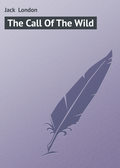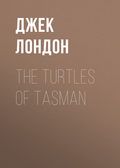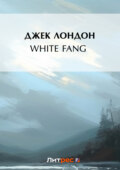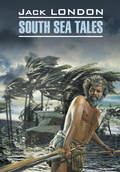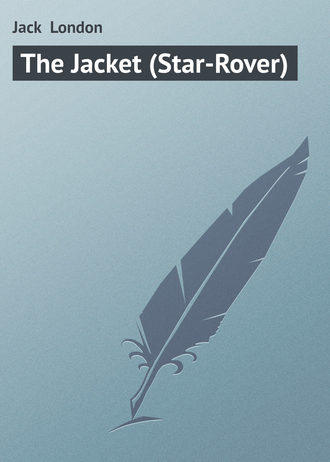
Джек Лондон
The Jacket (Star-Rover)
Where there had been five men of us on the wall, there came a time when there was one; where there had been half a thousand babes and younglings of ours, there were none. It was Nuhila, my woman, who cut off her hair and twisted it that I might have a strong string for my bow. The other women did likewise, and when the wall was attacked, stood shoulder to shoulder with us, in the midst of our spears and arrows raining down potsherds and cobblestones on the heads of the Snub-Noses.
Even the patient Snub-Noses we well-nigh out-patienced. Came a time when of ten men of us, but one was alive on the wall, and of our women remained very few, and the Snub-Noses held parley. They told us we were a strong breed, and that our women were men-mothers, and that if we would let them have our women they would leave us alone in the valley to possess for ourselves and that we could get women from the valleys to the south.
And Nuhila said no. And the other women said no. And we sneered at the Snub-Noses and asked if they were weary of fighting. And we were as dead men then, as we sneered at our enemies, and there was little fight left in us we were so weak. One more attack on the wall would end us. We knew it. Our women knew it. And Nuhila said that we could end it first and outwit the Snub-Noses. And all our women agreed. And while the Snub-Noses prepared for the attack that would be final, there, on the wall, we slew our women. Nuhila loved me, and leaned to meet the thrust of my sword, there on the wall. And we men, in the love of tribehood and tribesmen, slew one another till remained only Horda and I alive in the red of the slaughter. And Horda was my elder, and I leaned to his thrust. But not at once did I die. I was the last of the Sons of the Mountain, for I saw Horda, himself fall on his blade and pass quickly. And dying with the shouts of the oncoming Snub-Noses growing dim in my ears, I was glad that the Snub-Noses would have no sons of us to bring up by our women.
I do not know when this time was when I was a Son of the Mountain and when we died in the narrow valley where we had slain the Sons of the Rice and the Millet. I do not know, save that it was centuries before the wide-spreading drift of all us Sons of the Mountain fetched into India, and that it was long before ever I was an Aryan master in Old Egypt building my two burial places and defacing the tombs of kings before me.
I should like to tell more of those far days, but time in the present is short. Soon I shall pass. Yet am I sorry that I cannot tell more of those early drifts, when there was crushage of peoples, or descending ice-sheets, or migrations of meat.
Also, I should like to tell of Mystery. For always were we curious to solve the secrets of life, death, and decay. Unlike the other animals, man was for ever gazing at the stars. Many gods he created in his own image and in the images of his fancy. In those old times I have worshipped the sun and the dark. I have worshipped the husked grain as the parent of life. I have worshipped Sar, the Corn Goddess. And I have worshipped sea gods, and river gods, and fish gods.
Yes, and I remember Ishtar ere she was stolen from us by the Babylonians, and Ea, too, was ours, supreme in the Under World, who enabled Ishtar to conquer death. Mitra, likewise, was a good old Aryan god, ere he was filched from us or we discarded him. And I remember, on a time, long after the drift when we brought the barley into India, that I came down into India, a horse-trader, with many servants and a long caravan at my back, and that at that time they were worshipping Bodhisatwa.
Truly, the worships of the Mystery wandered as did men, and between filchings and borrowings the gods had as vagabond a time of it as did we. As the Sumerians took the loan of Shamashnapishtin from us, so did the Sons of Shem take him from the Sumerians and call him Noah.
Why, I smile me to-day, Darrell Standing, in Murderers’ Row, in that I was found guilty and awarded death by twelve jurymen staunch and true. Twelve has ever been a magic number of the Mystery. Nor did it originate with the twelve tribes of Israel. Star-gazers before them had placed the twelve signs of the Zodiac in the sky. And I remember me, when I was of the Assir, and of the Vanir, that Odin sat in judgment over men in the court of the twelve gods, and that their names were Thor, Baldur, Niord, Frey, Tyr, Bregi, Heimdal, Hoder, Vidar, Ull, Forseti, and Loki.
Even our Valkyries were stolen from us and made into angels, and the wings of the Valkyries’ horses became attached to the shoulders of the angels. And our Helheim of that day of ice and frost has become the hell of to-day, which is so hot an abode that the blood boils in one’s veins, while with us, in our Helheim, the place was so cold as to freeze the marrow inside the bones. And the very sky, that we dreamed enduring, eternal, has drifted and veered, so that we find to-day the scorpion in the place where of old we knew the goat, and the archer in the place of the crab.
Worships and worships! Ever the pursuit of the Mystery! I remember the lame god of the Greeks, the master-smith. But their vulcan was the Germanic Wieland, the master-smith captured and hamstrung lame of a leg by Nidung, the kind of the Nids. But before that he was our master-smith, our forger and hammerer, whom we named Il-marinen. And him we begat of our fancy, giving him the bearded sun-god for father, and nursing him by the stars of the bear. For, he, Vulcan, or Wieland, or Il-marinen, was born under the pine tree, from the hair of the wolf, and was called also the bear-father ere ever the Germans and Greeks purloined and worshipped him. In that day we called ourselves the Sons of the Bear and the Sons of the Wolf, and the bear and the wolf were our totems. That was before our drift south on which we joined with the Sons of the Tree-Grove and taught them our totems and tales.
Yes, and who was Kashyapa, who was Pururavas, but our lame master-smith, our iron-worker, carried by us in our drifts and re-named and worshipped by the south-dwellers and the east-dwellers, the Sons of the Pole and of the Fire Drill and Fire Socket.
But the tale is too long, though I should like to tell of the three-leaved Herb of Life by which Sigmund made Sinfioti alive again. For this is the very soma-plant of India, the holy grail of King Arthur, the-but enough! enough!
And yet, as I calmly consider it all, I conclude that the greatest thing in life, in all lives, to me and to all men, has been woman, is woman, and will be woman so long as the stars drift in the sky and the heavens flux eternal change. Greater than our toil and endeavour, the play of invention and fancy, battle and star-gazing and mystery-greatest of all has been woman.
Even though she has sung false music to me, and kept my feet solid on the ground, and drawn my star-roving eyes ever back to gaze upon her, she, the conserver of life, the earth-mother, has given me my great days and nights and fulness of years. Even mystery have I imaged in the form of her, and in my star-charting have I placed her figure in the sky.
All my toils and devices led to her; all my far visions saw her at the end. When I made the fire-drill and fire-socket, it was for her. It was for her, although I did not know it, that I put the stake in the pit for old Sabre-Tooth, tamed the horse, slew the mammoth, and herded my reindeer south in advance of the ice-sheet. For her I harvested the wild rice, tamed the barley, the wheat, and the corn.
For her, and the seed to come after whose image she bore, I have died in tree-tops and stood long sieges in cave-mouths and on mud-walls. For her I put the twelve signs in the sky. It was she I worshipped when I bowed before the ten stones of jade and adored them as the moons of gestation.
Always has woman crouched close to earth like a partridge hen mothering her young; always has my wantonness of roving led me out on the shining ways; and always have my star-paths returned me to her, the figure everlasting, the woman, the one woman, for whose arms I had such need that clasped in them I have forgotten the stars.
For her I accomplished Odysseys, scaled mountains, crossed deserts; for her I led the hunt and was forward in battle; and for her and to her I sang my songs of the things I had done. All ecstasies of life and rhapsodies of delight have been mine because of her. And here, at the end, I can say that I have known no sweeter, deeper madness of being than to drown in the fragrant glory and forgetfulness of her hair.
One word more. I remember me Dorothy, just the other day, when I still lectured on agronomy to farmer-boy students. She was eleven years old. Her father was dean of the college. She was a woman-child, and a woman, and she conceived that she loved me. And I smiled to myself, for my heart was untouched and lay elsewhere.
Yet was the smile tender, for in the child’s eyes I saw the woman eternal, the woman of all times and appearances. In her eyes I saw the eyes of my mate of the jungle and tree-top, of the cave and the squatting-place. In her eyes I saw the eyes of Igar when I was Ushu the archer, the eyes of Arunga when I was the rice-harvester, the eyes of Selpa when I dreamed of bestriding the stallion, the eyes of Nuhila who leaned to the thrust of my sword. Yes, there was that in her eyes that made them the eyes of Lei-Lei whom I left with a laugh on my lips, the eyes of the Lady Om for forty years my beggar-mate on highway and byway, the eyes of Philippa for whom I was slain on the grass in old France, the eyes of my mother when I was the lad Jesse at the Mountain Meadows in the circle of our forty great wagons.
She was a woman-child, but she was daughter of all women, as her mother before her, and she was the mother of all women to come after her. She was Sar, the corn-goddess. She was Isthar who conquered death. She was Sheba and Cleopatra; she was Esther and Herodias. She was Mary the Madonna, and Mary the Magdalene, and Mary the sister of Martha, also she was Martha. And she was Brunnhilde and Guinevere, Iseult and Juliet, Heloїse and Nicolette. Yes, and she was Eve, she was Lilith, she was Astarte. She was eleven years old, and she was all women that had been, all women to be.
I sit in my cell now, while the flies hum in the drowsy summer afternoon, and I know that my time is short. Soon they will apparel me in the shirt without a collar… But hush, my heart. The spirit is immortal. After the dark I shall live again, and there will be women. The future holds the little women for me in the lives I am yet to live. And though the stars drift, and the heavens lie, ever remains woman, resplendent, eternal, the one woman, as I, under all my masquerades and misadventures, am the one man, her mate.
CHAPTER XXII
My time grows very short. All the manuscript I have written is safely smuggled out of the prison. There is a man I can trust who will see that it is published. No longer am I in Murderers Row. I am writing these lines in the death cell, and the death-watch is set on me. Night and day is this death-watch on me, and its paradoxical function is to see that I do not die. I must be kept alive for the hanging, or else will the public be cheated, the law blackened, and a mark of demerit placed against the time-serving warden who runs this prison and one of whose duties is to see that his condemned ones are duly and properly hanged. Often I marvel at the strange way some men make their livings.
This shall be my last writing. To-morrow morning the hour is set. The governor has declined to pardon or reprieve, despite the fact that the Anti-Capital-Punishment League has raised quite a stir in California. The reporters are gathered like so many buzzards. I have seen them all. They are queer young fellows, most of them, and most queer is it that they will thus earn bread and butter, cocktails and tobacco, room-rent, and, if they are married, shoes and schoolbooks for their children, by witnessing the execution of Professor Darrell Standing, and by describing for the public how Professor Darrell Standing died at the end of a rope. Ah, well, they will be sicker than I at the end of the affair.
As I sit here and muse on it all, the footfalls of the death-watch going up and down outside my cage, the man’s suspicious eyes ever peering in on me, almost I weary of eternal recurrence. I have lived so many lives. I weary of the endless struggle and pain and catastrophe that come to those who sit in the high places, tread the shining ways, and wander among the stars.
Almost I hope, when next I reinhabit form, that it shall be that of a peaceful farmer. There is my dream-farm. I should like to engage just for one whole life in that. Oh, my dream-farm! My alfalfa meadows, my efficient Jersey cattle, my upland pastures, my brush-covered slopes melting into tilled fields, while ever higher up the slopes my angora goats eat away brush to tillage!
There is a basin there, a natural basin high up the slopes, with a generous watershed on three sides. I should like to throw a dam across the fourth side, which is surprisingly narrow. At a paltry price of labour I could impound twenty million gallons of water. For, see: one great drawback to farming in California is our long dry summer. This prevents the growing of cover crops, and the sensitive soil, naked, a mere surface dust-mulch, has its humus burned out of it by the sun. Now with that dam I could grow three crops a year, observing due rotation, and be able to turn under a wealth of green manure…
* * * * *
I have just endured a visit from the Warden. I say “endured” advisedly. He is quite different from the Warden of San Quentin. He was very nervous, and perforce I had to entertain him. This is his first hanging. He told me so. And I, with a clumsy attempt at wit, did not reassure him when I explained that it was also my first hanging. He was unable to laugh. He has a girl in high school, and his boy is a freshman at Stanford. He has no income outside his salary, his wife is an invalid, and he is worried in that he has been rejected by the life insurance doctors as an undesirable risk. Really, the man told me almost all his troubles. Had I not diplomatically terminated the interview he would still be here telling me the remainder of them.
My last two years in San Quentin were very gloomy and depressing. Ed Morrell, by one of the wildest freaks of chance, was taken out of solitary and made head trusty of the whole prison. This was Al Hutchins’ old job, and it carried a graft of three thousand dollars a year. To my misfortune, Jake Oppenheimer, who had rotted in solitary for so many years, turned sour on the world, on everything. For eight months he refused to talk even to me.
In prison, news will travel. Give it time and it will reach dungeon and solitary cell. It reached me, at last, that Cecil Winwood, the poet-forger, the snitcher, the coward, and the stool, was returned for a fresh forgery. It will be remembered that it was this Cecil Winwood who concocted the fairy story that I had changed the plant of the non-existent dynamite and who was responsible for the five years I had then spent in solitary.
I decided to kill Cecil Winwood. You see, Morrell was gone, and Oppenheimer, until the outbreak that finished him, had remained in the silence. Solitary had grown monotonous for me. I had to do something. So I remembered back to the time when I was Adam Strang and patiently nursed revenge for forty years. What he had done I could do if once I locked my hands on Cecil Winwood’s throat.
It cannot be expected of me to divulge how I came into possession of the four needles. They were small cambric needles. Emaciated as my body was, I had to saw four bars, each in two places, in order to make an aperture through which I could squirm. I did it. I used up one needle to each bar. This meant two cuts to a bar, and it took a month to a cut. Thus I should have been eight months in cutting my way out. Unfortunately, I broke my last needle on the last bar, and I had to wait three months before I could get another needle. But I got it, and I got out.
I regret greatly that I did not get Cecil Winwood. I had calculated well on everything save one thing. The certain chance to find Winwood would be in the dining-room at dinner hour. So I waited until Pie-Face Jones, the sleepy guard, should be on shift at the noon hour. At that time I was the only inmate of solitary, so that Pie-Face Jones was quickly snoring. I removed my bars, squeezed out, stole past him along the ward, opened the door and was free… to a portion of the inside of the prison.
And here was the one thing I had not calculated on-myself. I had been five years in solitary. I was hideously weak. I weighed eighty-seven pounds. I was half blind. And I was immediately stricken with agoraphobia. I was affrighted by spaciousness. Five years in narrow walls had unfitted me for the enormous declivity of the stairway, for the vastitude of the prison yard.
The descent of that stairway I consider the most heroic exploit I ever accomplished. The yard was deserted. The blinding sun blazed down on it. Thrice I essayed to cross it. But my senses reeled and I shrank back to the wall for protection. Again, summoning all my courage, I attempted it. But my poor blear eyes, like a bat’s, startled me at my shadow on the flagstones. I attempted to avoid my own shadow, tripped, fell over it, and like a drowning man struggling for shore crawled back on hands and knees to the wall.
I leaned against the wall and cried. It was the first time in many years that I had cried. I remember noting, even in my extremity, the warmth of the tears on my cheeks and the salt taste when they reached my lips. Then I had a chill, and for a time shook as with an ague. Abandoning the openness of the yard as too impossible a feat for one in my condition, still shaking with the chill, crouching close to the protecting wall, my hands touching it, I started to skirt the yard.
Then it was, somewhere along, that the guard Thurston espied me. I saw him, distorted by my bleared eyes, a huge, well-fed monster, rushing upon me with incredible speed out of the remote distance. Possibly, at that moment, he was twenty feet away. He weighed one hundred and seventy pounds. The struggle between us can be easily imagined, but somewhere in that brief struggle it was claimed that I struck him on the nose with my fist to such purpose as to make that organ bleed.
At any rate, being a lifer, and the penalty in California for battery by a lifer being death, I was so found guilty by a jury which could not ignore the asseverations of the guard Thurston and the rest of the prison hang-dogs that testified, and I was so sentenced by a judge who could not ignore the law as spread plainly on the statute book.
I was well pummelled by Thurston, and all the way back up that prodigious stairway I was roundly kicked, punched, and cuffed by the horde of trusties and guards who got in one another’s way in their zeal to assist him. Heavens, if his nose did bleed, the probability is that some of his own kind were guilty of causing it in the confusion of the scuffle. I shouldn’t care if I were responsible for it myself, save that it is so pitiful a thing for which to hang a man…
* * * * *
I have just had a talk with the man on shift of my death-watch. A little less than a year ago, Jake Oppenheimer occupied this same death-cell on the road to the gallows which I will tread to-morrow. This man was one of the death-watch on Jake. He is an old soldier. He chews tobacco constantly, and untidily, for his gray beard and moustache are stained yellow. He is a widower, with fourteen living children, all married, and is the grandfather of thirty-one living grandchildren, and the great-grandfather of four younglings, all girls. It was like pulling teeth to extract such information. He is a queer old codger, of a low order of intelligence. That is why, I fancy, he has lived so long and fathered so numerous a progeny. His mind must have crystallized thirty years ago. His ideas are none of them later than that vintage. He rarely says more than yes and no to me. It is not because he is surly. He has no ideas to utter. I don’t know, when I live again, but what one incarnation such as his would be a nice vegetative existence in which to rest up ere I go star-roving again…
But to go back. I must take a line in which to tell, after I was hustled and bustled, kicked and punched, up that terrible stairway by Thurston and the rest of the prison-dogs, of the infinite relief of my narrow cell when I found myself back in solitary. It was all so safe, so secure. I felt like a lost child returned home again. I loved those very walls that I had so hated for five years. All that kept the vastness of space, like a monster, from pouncing upon me were those good stout walls of mine, close to hand on every side. Agoraphobia is a terrible affliction. I have had little opportunity to experience it, but from that little I can only conclude that hanging is a far easier matter…
I have just had a hearty laugh. The prison doctor, a likable chap, has just been in to have a yarn with me, incidentally to proffer me his good offices in the matter of dope. Of course I declined his proposition to “shoot me” so full of morphine through the night that to-morrow I would not know, when I marched to the gallows, whether I was “coming or going.”
But the laugh. It was just like Jake Oppenheimer. I can see the lean keenness of the man as he strung the reporters with his deliberate bull which they thought involuntary. It seems, his last morning, breakfast finished, incased in the shirt without a collar, that the reporters, assembled for his last word in his cell, asked him for his views on capital punishment.
- Who says we have more than the slightest veneer of civilization coated over our raw savagery when a group of living men can ask such a question of a man about to die and whom they are to see die?
But Jake was ever game. “Gentlemen,” he said, “I hope to live to see the day when capital punishment is abolished.”
I have lived many lives through the long ages. Man, the individual, has made no moral progress in the past ten thousand years. I affirm this absolutely. The difference between an unbroken colt and the patient draught-horse is purely a difference of training. Training is the only moral difference between the man of to-day and the man of ten thousand years ago. Under his thin skin of morality which he has had polished onto him, he is the same savage that he was ten thousand years ago. Morality is a social fund, an accretion through the painful ages. The new-born child will become a savage unless it is trained, polished, by the abstract morality that has been so long accumulating.
“Thou shalt not kill”-piffle! They are going to kill me to-morrow morning. “Thou shalt not kill”-piffle! In the shipyards of all civilized countries they are laying to-day the keels of Dreadnoughts and of Superdreadnoughts. Dear friends, I who am about to die, salute you with-“Piffle!”
I ask you, what finer morality is preached to-day than was preached by Christ, by Buddha, by Socrates and Plato, by Confucius and whoever was the author of the “Mahabharata”? Good Lord, fifty thousand years ago, in our totem-families, our women were cleaner, our family and group relations more rigidly right.
I must say that the morality we practised in those old days was a finer morality than is practised to-day. Don’t dismiss this thought hastily. Think of our child labour, of our police graft and our political corruption, of our food adulteration and of our slavery of the daughters of the poor. When I was a Son of the Mountain and a Son of the Bull, prostitution had no meaning. We were clean, I tell you. We did not dream such depths of depravity. Yea, so are all the lesser animals of to-day clean. It required man, with his imagination, aided by his mastery of matter, to invent the deadly sins. The lesser animals, the other animals, are incapable of sin.
I read hastily back through the many lives of many times and many places. I have never known cruelty more terrible, nor so terrible, as the cruelty of our prison system of to-day. I have told you what I have endured in the jacket and in solitary in the first decade of this twentieth century after Christ. In the old days we punished drastically and killed quickly. We did it because we so desired, because of whim, if you so please. But we were not hypocrites. We did not call upon press, and pulpit, and university to sanction us in our wilfulness of savagery. What we wanted to do we went and did, on our legs upstanding, and we faced all reproof and censure on our legs upstanding, and did not hide behind the skirts of classical economists and bourgeois philosophers, nor behind the skirts of subsidized preachers, professors, and editors.
Why, goodness me, a hundred years ago, fifty years ago, five years ago, in these United States, assault and battery was not a civil capital crime. But this year, the year of Our Lord 1913, in the State of California, they hanged Jake Oppenheimer for such an offence, and to-morrow, for the civil capital crime of punching a man on the nose, they are going to take me out and hang me. Query: Doesn’t it require a long time for the ape and the tiger to die when such statutes are spread on the statute book of California in the nineteen-hundred-and-thirteenth year after Christ? Lord, Lord, they only crucified Christ. They have done far worse to Jake Oppenheimer and me…



